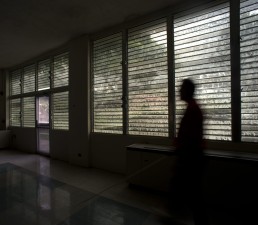S1: Episode 20 - Dean Georgiev

Episode Information
[Intro Music]
Narrator: Welcome to my Heart is Not Blind. Narrative histories about blindness and perception. A traveling exhibition and book published by Trinity University Press, supported by Kronkosky Charitable Foundation, edited and hosted by Michael Nye. Stories are often found, resting along the edges of surprise and revelation. Every person, every place is a map to somewhere else. Episode 20, Dean Georgiev
Dean: My name is Dean Georgiev. I live in Milani, Hawaii. It’s, uh, a good sized little town in the center of the island of Oahu. I live there with my wife and I have two children who are grown now. And, um, I work for the Department of Vocational Rehabilitation in the Blindness Services branch called Ho’oponopono. In Hawaiian means to make things right. When I was seven years old, I imagined bright Sunday mornings with a blue sky over a neighborhood crispness of the air going into the woods behind our house. I was always somebody who was curious and I’d ask questions like, where does this path go? And I would follow it to explore. I didn’t know it at the time, but it was part of the way I learned and figure things out. I always wanted to know why. Well, if someone asked me to describe myself, the last thing I would say is blind.
The first thing I would say is American, father. Another thing that I came upon later in life was the identity of teacher. And I like it when I can make a positive difference in someone else’s life. One of the biggest confusing things about identity is the blindness part. It changes things sometimes it makes you seem limited. I believe that when a person gets to know another person, what you believe in what you do, and after a while, your blindness becomes less important to them. And they might even come to the point where they say, wow, I, I forget that you’re blind. Well, good. You know, good that you forget that I’m blind. As I lost my vision sound has become primary and it wasn’t an easy process, but I was able to recognize the anatomy of sound. My hearing is normal. Beyond that, though, what’s really changed, I am able to distinguish things.
If I tap on something, depending on movement, depending on the air, depending on the acoustics in the room, that same tap is gonna sound different. And I can hear a building beside me when I walk. It’s, it’s like a whole world. It’s, gosh, it’s, it’s like a whole tapestry. If you were to think of a bunch of different colors, that’s how different sound is coming from all the different directions. You could have the same exact sound, but because of what it’s around or where it’s coming from, you’ll be able to figure out and give it meaning.
Baseball is something I love. I love it in its asymmetry. I love it in its rules. I love it in its tradition. There is just moments in a baseball game that can be just so dramatic. It’s a sport that is quiet, one moment, kind of a lazy pace to the game that suddenly erupts in a burst of excitement that you can get a feeling for the crack of a bat or a ball hitting a glove. And then there’s the food that you smell. There’s people around you, they’re having conversations. And it is just totally non-visual experience that is so rich. That’s my idea of heaven and beauty. There’s, there’s one thing about blindness that really keeps a lot of blind people, prisoners to themselves. And when I got to the point where I lost vision to the point where it wasn’t usable anymore, and I just let it go, I felt so free.
I felt so, so unburdened because now I could focus on non-visual learning. And what happened is the world just opened up. It was like, if you take away the daylight and then only when it’s night are you able to see the vast universe of stars that are out there. So think of this analogy that the sun representing vision, and then all of a sudden it’s gone. Well, what is there? There’s not nothing. There’s a whole universe of stars that reveal themselves to you. And that’s what people don’t know about blindness. That when you take away the vision, that you’re taking away everything. Now you just basically uncover or allow other things to be revealed to you.
[Outro Music]
Host: Everyone in these narrative conversations knows something that no one else knows. Something important and valuable, A necessary wisdom. Born from experience. Dean Giorgio and I met on three separate early mornings in his office in Honolulu, Hawaii. He listens deeply and speaks with careful deliberation. He’s passionate about the role and responsibility of a teacher. Dean is a supervisor of the new program called ho’oponopono, which means to make things right. Their new vision program is based on the Socratic method. They believe that the quality of the questions and inquiry impacts one’s ability to adapt and progress and learn. The new vision program advocates learning by doing progress, by questioning assumptions and adaptation, by examining perspectives. Dean said, “If you ask why am I blind are, why do I feel angry? These are very different questions and potential answers than asking, how can I adapt and live a meaningful life?”
Join us next week. Two new episodes will be released. Please subscribe, rate, and review this podcast. You can also go to my website, michaelnye.org/podcast for portraits and transcripts. Thank you for listening.
